In this article:
It is inevitable for your body to age as you grow old. While aging includes different aspects such as lowering of metabolism and weakening of bones and muscles, it is primarily seen in the form of skin aging signs such as wrinkles, fine lines, and sagging.
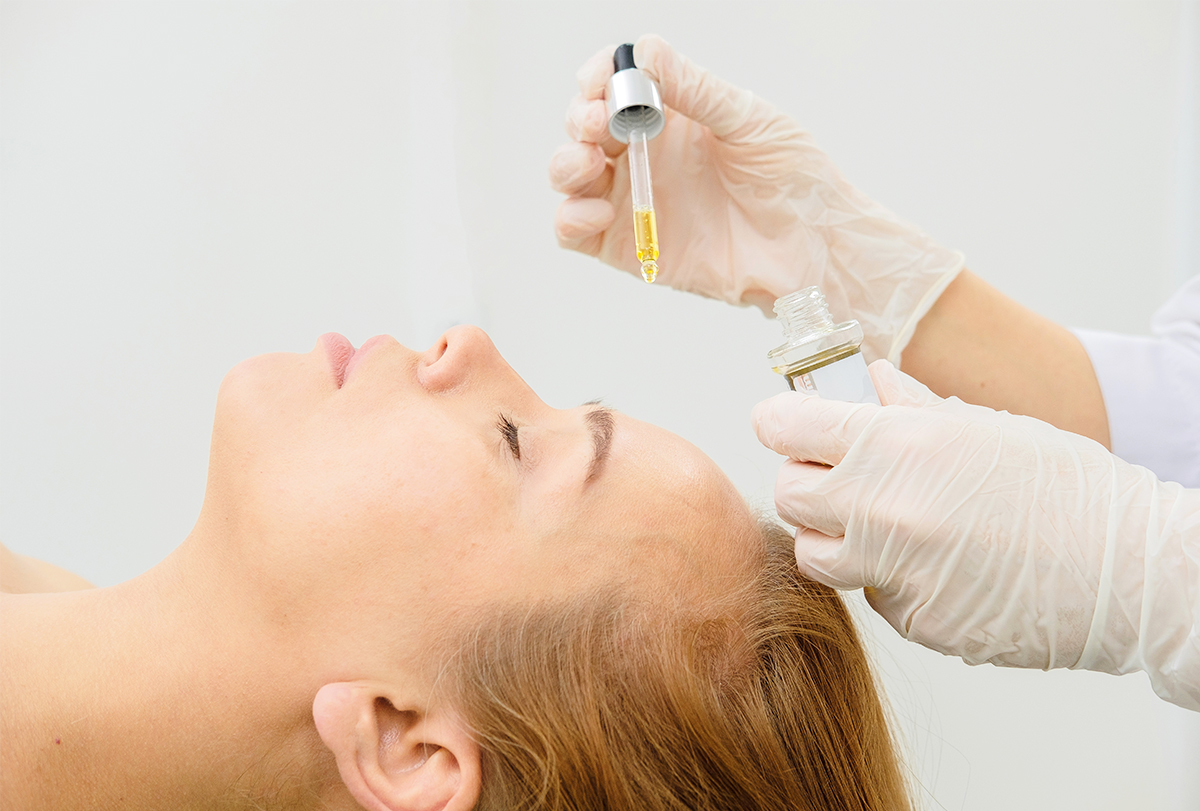
It is common to notice premature aging of the skin as well, generally due to constant exposure to sunlight. Photoaging caused by sun exposure involves loss of elasticity, wrinkles, damage of skin barrier, and dryness as the ultraviolet (UV) rays create free radicals in the skin, causing oxidative damage.
Skin aging cannot be prevented, but you can follow proper skin care measures to slow down the process and prevent premature aging. This article talks about different oils that exhibit antiaging effects that can be used to make your skin look younger.
Caution: Make sure to conduct a patch test before applying any oil to your skin to check for skin sensitivity and allergies. Avoid ingesting essential oils.
1. Moroccan Argan Oil
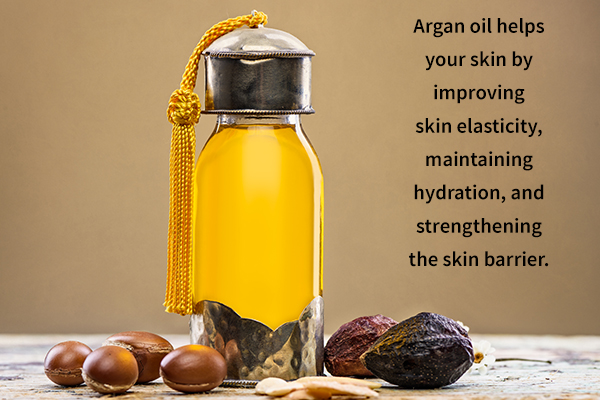
Source: Argan oil is sourced from the kernels of Argan trees grown in Morocco.
Chemistry: Argan oil is rich in monounsaturated fatty acids. It also contains sterols, polyphenols, squalene, and tocopherols.
Antiaging properties: Due to its monounsaturated fatty acids content, argan oil is easily absorbed deep into the skin. Argan oil helps your skin by improving skin elasticity, (1) maintaining hydration, and strengthening the skin barrier. In addition, it helps keep your skin supple and soft.
Usage: You can use argan oil as a carrier oil to mix essential oils in and apply the oil blend topically. It is suggested to use argan oil daily for best results.
2. Olive Oil
Source: Olive oil is extracted from the fruits of Olea europaea trees.
Chemistry: Olive oil has a high content of antioxidant, water-loving polyphenols. It contains squalene, monounsaturated fatty acids, carotenoids, and sterols.
Antiaging properties: Olive oil is known to have wound-healing properties. It helps maintain skin structure and reduces free radicals that cause oxidative cellular and DNA damage.
Additionally, the squalene in olive oil helps prevent photodamage and skin dryness. (2) Olive oil also possesses anti-inflammatory properties that help lower the risk of age-related health problems such as osteoporosis.
Usage:
- Use olive oil for everyday cooking for its beneficial antiaging effects.
- Olive oil can also be used topically with buckthorn oil. However, it should be used in small quantities.
Caution: People with extreme skin dryness or dermatitis should not use olive oil topically.
3. Almond Oil
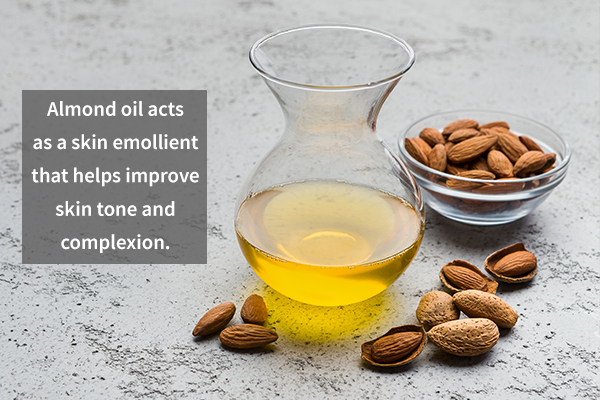
Source: Almond oil is made by pressing almonds obtained from Oleum amygdalae.
Chemistry: Almond oil is known for its vitamins A and E content. It is chiefly composed of unsaturated fatty acids and also contains sterols such as α-tocopherol.
Antiaging properties: Almond oil acts as a skin emollient that helps improve skin tone and complexion. It can help manage and fade stretch marks as well. (3) Almond oil also prevents photodamage, fades dark circles and wrinkles, and boosts blood circulation.
Usage:
- Warm up some bitter or sweet almond oil and massage it onto your skin.
- You can also use almond oil as a carrier oil.
- You can also use serums and creams containing almond oils.
- For oral use, you can drizzle almond oil onto your salad, or add 2–3 tsp of sweet almond oil to milk or smoothies.
4. Jojoba Oil
Source: Jojoba oil is sourced from the seeds of Simmondsia chinensis shrub.
Chemistry: Jojoba oil contains a rich mixture of wax esters, palmitic acid, gadoleic acid, erucic acid, stearic acid, oleic acid, vitamin B, and vitamin E.
Antiaging properties: You can use jojoba oil for its emollient properties that soften the skin. Jojoba oil is readily absorbed by the skin, nourishing and hydrating it from within. It also exhibits antioxidant effects that lower free radicals in the body.
Moreover, jojoba oil helps in improving the skin barrier and reducing tissue inflammation. (4) It is also highly effective in strengthening and softening the hair.
Usage:
- Use moisturizers and sunscreens containing jojoba oil.
- Massage your skin with pure jojoba oil after a shower.
- Add a few drops of jojoba oil to a facial clay mask for its antiaging effects. (5)
5. Avocado Oil
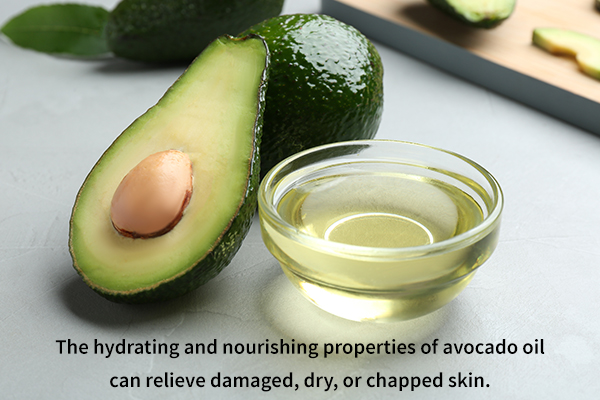
Source: Avocado oil is extracted from the pulp of the avocado fruit, taken from Persea americana plant.
Chemistry: Avocado oil is chiefly composed of unsaturated fatty acids such as oleic acid, linoleic acid, and linolenic acid. It is also rich in β-sitosterol, lecithin, β-carotene, and vitamins A, C, D, and E.
Antiaging properties: Avocado oil contains hydroxyproline, which aids in the healing of wounds and scars. The hydrating and nourishing properties of avocado oil can relieve damaged, dry, or chapped skin. (6) Additionally, avocado oil helps lower tissue inflammation and boosts collagen production to improve skin elasticity and strength.
Usage:
- Warm up some avocado oil and use it to massage your skin.
- Use avocado oil as a carrier oil and create your own oil blend.
- Avocado oil can also be found in soaps, massage oil, gels, bath oils, lotions, shampoos, serums, cleansers, creams, and conditioners that can easily be purchased for use.
6. Pomegranate Seed Oil
Source: Pomegranate seed oil is extracted from the seeds of Punica granatum.
Chemistry: Pomegranate seed oil has a high content of essential fatty acids such as oleic acid. It is also rich in phenols and plant sterols.
Antiaging properties: Pomegranate seed oil is a potent anti-inflammatory and antioxidant agent. Its high fatty acid composition helps it penetrate the skin easily. Pomegranate seed oil can help fade stretch marks, (7) prevent photoaging, lower the risk of tumor cell proliferation, and also boost collagen production. (8)
Usage: Use cold-pressed pomegranate oil to massage your skin regularly for best results.
7. Wheat Germ Oil
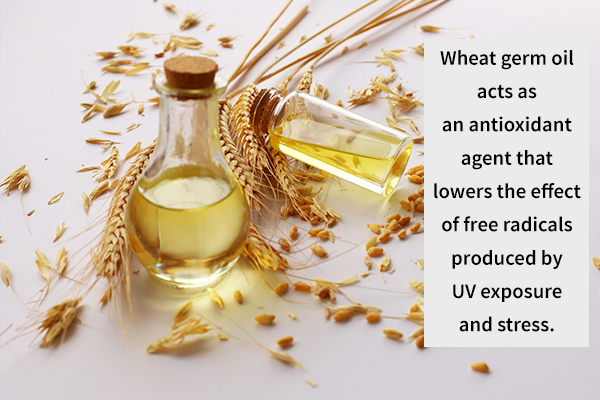
Source: Wheat germ oil is sourced from wheat kernel germ.
Chemistry: Wheat germ oil is a good source of vitamins A, D, and E. It also contains tocopherols, alkanols, glycolipids, triterpenoids, sterols, and other volatile components.
Antiaging properties: Wheat germ oil acts as an antioxidant agent that lowers the effect of free radicals produced by UV exposure and stress. It also improves skin regeneration and the functioning of muscles and lymph.
These properties of wheat germ oil make it a potential treatment for skin dryness, skin aging, scar tissue, and stretch marks. Regular use of wheat germ oil can also smoothen your skin. (9)
Usage:
- Add a few drops of wheat germ oil to 1 tbsp of aloe vera gel and massage it onto your skin for about 5 minutes. Rinse your skin after 10 minutes with lukewarm water. Using aloe vera gel and wheat germ oil together has been shown to produce synergistic effects.
- Use wheat germ oil as a carrier oil or use wheat germ oil-based products.
8. Grape Seed Oil
Source: Grape seed oil is obtained from the seeds of the plant Vitis vinifera.
Chemistry: Grape seed oil has a high content of phenolics such as proanthocyanidins. It also contains phytosterols, free fatty acids, and a wide range of vitamins.
Antiaging properties: Grape seed oil can boost skin healing, vascularization, and the formation of skin tissue under the skin. These effects help increase blood supply to the skin and maintain skin elasticity. The use of grape seed oil can also lower cellular inflammation. (10)
Usage:
- Massage your skin with grape seed oil either in its pure form or mixed with essential oils.
- Use grape seed oil-based creams and serums, which are widely available today.
9. Rosehip Oil
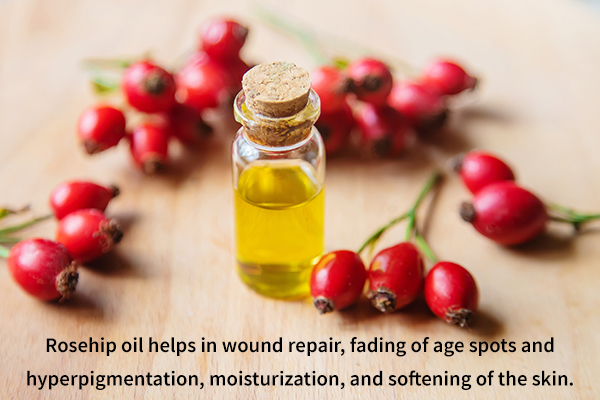
Source: Rosehip oil is sourced from the seeds of Rosa canina, a plant native to South Africa and Europe.
Chemistry: Rosehip oil contains a mix of oleic acid, linoleic acid, linolenic acid, vanillin, vanillic acid, and stearic acid. It has a high amount of carotenoids and tocopherols.
Antiaging properties: Rich in unsaturated fatty acids and antioxidant compounds, rosehip oil is highly useful against oxidative damage and inflammation. (11) It also helps in wound repair, fading of age spots and hyperpigmentation, moisturization, and softening of the skin.
Usage:
- Apply rosehip oil directly to the skin.
- Mix rosehip oil with essential oils and sugar or salt, and use this mixture as a body scrub.
Caution: If you have oily or acne-prone skin, always dilute the oil and use minimum quantity.
10. Rosemary Essential Oil
Source: Rosemary essential oil is obtained from Rosmarinus officinalis, a Mediterranean woody herb.
Chemistry: Rosemary essential oil has a high content of diterpenes such as ursolic acid, carnosol, caffeic acid, and rosmarinic acid. It also contains beneficial monoterpenes such as α-pinene and camphor.
Antiaging properties: Rosemary oil is a potent antioxidant and hepatoprotective agent. It also boosts blood circulation, reduces muscle pain, lowers tissue inflammation, and prevents photodamage. (12)
Usage: Dilute rosemary essential oil with any carrier oil and massage it onto your skin.
11. Lemon Essential Oil
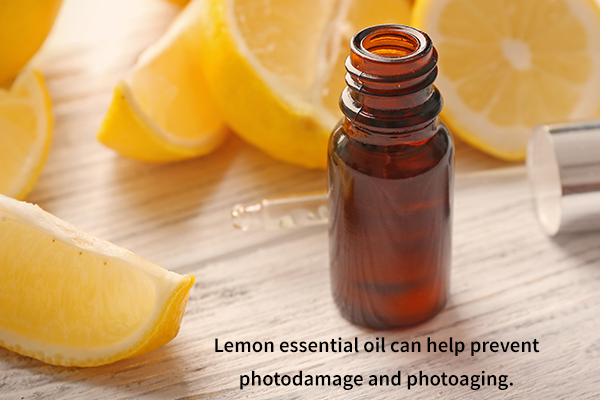
Source: The peel of fresh lemons is the source of lemon essential oil.
Chemistry: Lemon essential oil is abundant in vitamin C or ascorbic acid, vitamin E, α-tocopherol, and glutathione.
Antiaging properties: The antioxidant-rich composition of lemon essential oil prevents oxidative damage to the skin caused by free radicals. Therefore, lemon essential oil can help prevent photodamage and photoaging.
Usage:
- Use lemon essential oil with carrier oils such as jojoba oil, sweet almond oil, or avocado oil.
- Add a few drops of lemon essential oil to your daily moisturizer for use.
12. Wild Carrot Seed Essential Oil
Source: Carrot seed essential oil is obtained from the dried seeds of Daucus carota.
Chemistry: Wild carrot seed oil chiefly contains daucene, daucol, carotol, and β-bisabolene.
Antiaging properties: Carrot seed oil is known to help in skin repair, muscle toning, and protection against photodamage. (13) It also helps tighten the skin, thus preventing skin sagging. Moreover, carrot seed oil lowers inflammation, boosts immune function, and relieves stress when used for aromatherapy.
Usage:
- Mix carrot seed essential oil with your regular massage oil and use.
- Add a few drops of carrot seed essential oil into your antiaging face masks.
- For aromatherapy, add a few drops of carrot seed essential oil to an electric diffuser and use.
13. Ylang-ylang Essential Oil
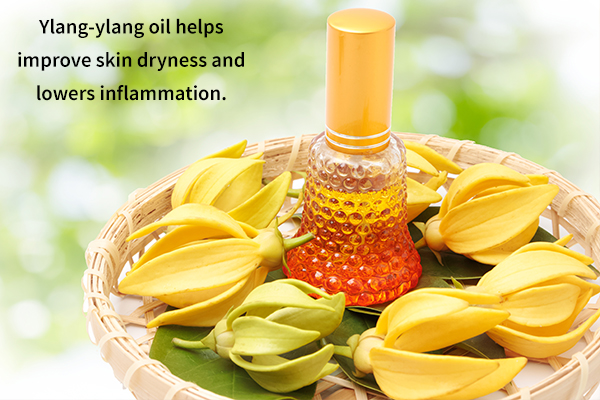
Source: Ylang-ylang essential oil is extracted from the flowers of Cananga odorata.
Chemistry: Ylang-ylang essential oil contains various active compounds such as linalool, β-caryophyllene, germacrene-D, cresol, geraniol, and farnesene.
Antiaging properties: Ylang-ylang essential oil is a potent antioxidant agent that not only helps prevent photodamage but also helps fade sunspots by lowering melanin production. Moreover, ylang-ylang oil helps improve skin dryness and lowers inflammation.
You can also use ylang-ylang essential oil for stress relief, which can otherwise contribute to premature aging. (14)
Usage: Dilute a few drops of ylang-ylang essential oil in a carrier oil such as coconut oil, and massage the oil blend onto your scalp and skin.
14. Neroli Essential Oil
Source: Neroli essential oil comes from the flowers of the bitter orange tree.
Chemistry: The chief compounds of neroli essential oil include linalool, linalyl acetate, citral, α-terpineol, nerolidol, and limonene.
Antiaging properties: Neroli essential oil is seen to possess anxiolytic and antioxidant properties. (15) The citral present in neroli oil helps in cell regeneration, thus preventing premature skin aging. It also helps in smoothening and firming the skin, therefore aiding in the management of fine lines and skin sagging.
Moreover, neroli essential oil acts as an antiseptic agent that prevents and manages skin infections. (16)
Usage: Mix 5–7 drops of neroli essential oil with 2 tbsp of carrier oil of your choice. Take a small amount of the diluted oil and apply it to your skin before bedtime.
15. Frankincense Essential Oil
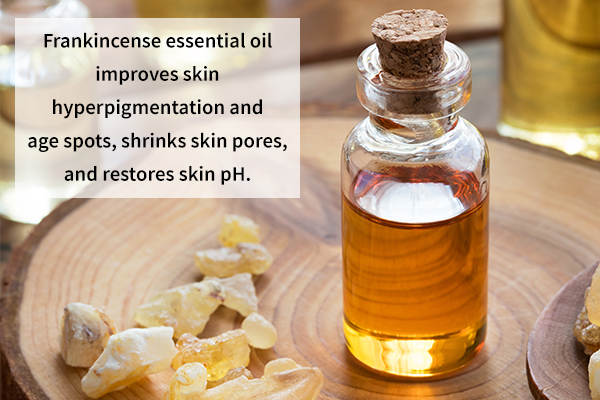
Source: The dried resin of the frankincense tree is used for the extraction of frankincense essential oil.
Chemistry: Frankincense essential oil contains terpenes, octyl acetate, ethyl acetate, and methylanisole.
Antiaging properties: Frankincense essential oil is known for its cytophylactic properties that boost new cell growth, therefore supporting a healthy cell turnover rate. This nature of frankincense essential oil also aids in wound healing without scar formation. (17)
Moreover, frankincense essential oil improves skin hyperpigmentation and age spots, shrinks skin pores, and restores skin pH. This oil also fades under-eye wrinkles, restores skin elasticity, and prevents tumor growth. (18)
Usage: Dilute frankincense essential oil with a carrier oil of your choice and use.
16. Lavender Essential Oil
Source: Lavender essential oil is extracted from the flowers of Lavandula angustifolia.
Chemistry: Lavender essential oil contains different active compounds, including linalool, camphor, cineole, linalyl acetate, terpinenol, and β-ocimene.
Antiaging properties: Lavender essential oil is a potent antioxidant agent that protects the skin against photodamage. (19) This essential oil boosts collagen production and helps maintain skin structure integrity.
Moreover, lavender essential oil accelerates skin healing, (20) improves blood circulation, exhibits neuroprotective properties, and acts as an anxiolytic agent.
Usage: Dilute lavender essential oil by mixing 10 drops of it with 1 ounce of carrier oil such as olive oil.
Note: Aside from the oils mentioned above, various other essential oils have been shown to exhibit antiaging effects, including sandalwood, Cyprus, geranium, rose, clary sage, patchouli, jasmine, myrrh, parsley seed, and helichrysum essential oil. (21)
Final Word
Skin aging is a natural process that generally manifests in the form of wrinkles, fine lines, dryness, and skin thinning as age increases. The aging process is accelerated by constant exposure to environmental factors, known as premature aging.
The use of antiaging agents such as oils can not only prevent premature aging but can also limit or delay the signs of normal aging. You can try the different natural oils mentioned in the article to fade your fine lines and wrinkles and prevent their appearance. However, make sure that you are not allergic to the oil before use.
- Was this article helpful?
- YES, THANKS!NOT REALLY


